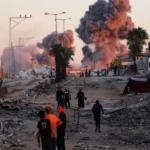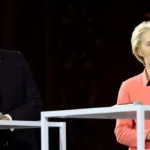UK Sanctions Russia’s Oil Giants to Cripple War Funding Amid Ukraine Conflict
The UK government has imposed its most severe sanctions yet on Russia’s largest oil companies, Rosneft and Lukoil, as part of a comprehensive effort to cut off Vladimir Putin’s funding for the war in Ukraine. These measures also target 51 vessels in Russia’s “shadow fleet” used to evade sanctions and covertly export oil, alongside key Chinese oil terminals and a major Indian energy company facilitating Russian oil sales. This decisive action aims to remove millions of barrels of Russian oil from global markets and ramp up international pressure to halt Moscow’s military aggression.
Targeting Russia’s Oil Giants: The Core of UK’s Sanctions
Rosneft and Lukoil, Russia’s two biggest energy firms, collectively export approximately 3.1 million barrels of oil per day, with Rosneft alone producing nearly half of all Russian oil and accounting for 6% of global oil output. By sanctioning these firms, the UK government is striking directly at the heart of Russia’s war chest, aiming to sever critical revenue streams that finance its military operations in Ukraine.
The UK’s intensified sanctions package includes 90 listings that also extend to four Chinese oil terminals and Nayara Energy Limited, an Indian oil refinery that imported over 100 million barrels of Russian crude oil worth more than $5 billion in 2024. The sanctions ban all British business interactions with these entities, aiming to dismantle Russia’s oil export infrastructure and global enablers supporting its energy trade.
The Shadow Fleet: Covert Oil Export Under Scrutiny
One of the most significant components of the UK’s new sanctions targets 51 vessels operating within Russia’s “shadow fleet.” These aging tankers are used to sidestep international sanctions, allowing Russia to covertly export oil worldwide despite restrictions. The UK has sanctioned more vessels in this fleet than any other nation, seeking to disrupt clandestine oil transportation networks maintaining Russian oil sales.
Official Statements and International Context
Foreign Secretary Yvette Cooper announced the sanctions in Parliament, emphasizing the government’s commitment to cutting off Putin’s revenue streams and supporting a just and lasting peace in Ukraine. Chancellor Rachel Reeves highlighted the global dimension of the effort during her visit to Washington DC for the International Monetary Fund’s Annual Meetings and a Ukraine roundtable.
Reeves underscored the need for cooperation from international partners, especially India and China, urging them to cease facilitating Russian oil shipments. She stated, “There is no room for Russian oil in global markets,” affirming the UK’s determination to take all necessary actions to choke the Kremlin’s financial capabilities enabling the war.
The sanctions package coincides with the G7’s discussions to potentially seize hundreds of billions of dollars in frozen Russian assets, reinforcing the broader international effort to pressure Moscow economically.
Impact and Reactions
UK’s Financial Impact on Russia
The UK has frozen approximately £28.7 billion of Russian assets since February 2022, reflecting its leading role in sanction enforcement. The latest sanctions aim to further isolate Russia economically, particularly by targeting key sectors and companies central to its war effort.
Nayara Energy Limited, partially owned by Rosneft since 2017, was also sanctioned for its substantial role in importing Russian crude. This reflects the UK government’s broader attempt to cut off financial flows through third-party actors that enable Russia’s oil trade.
Global Responses and Russian Counterclaims
The Russian embassy in London warned that these sanctions could destabilize global markets and raise consumer costs but insisted they would not significantly impact Russia’s economy. Meanwhile, reports indicate that some Indian refiners plan a gradual reduction in their Russian oil imports in response to increasing diplomatic pressure from the UK and United States.
The UK continues to collaborate closely with international partners, emphasizing joint responsibility in preventing Russia from circumventing sanctions and funding its military actions.
Key Statistics and Facts
| Data Point | Figure/Detail |
|---|---|
| Daily oil exports by Rosneft and Lukoil | 3.1 million barrels per day |
| Rosneft’s share of global oil production | 6% |
| Russian crude imported by Nayara Energy Limited in 2024 | Over 100 million barrels worth $5 billion |
| Number of vessels sanctioned in Russia’s shadow fleet | 51 |
| Total new UK sanctions announced | 90 listings, including companies and vessels |
In conclusion, the UK’s extensive sanctions against Russia’s oil giants Rosneft and Lukoil, alongside the shadow fleet and key global enablers, represent a significant escalation in efforts to choke off Kremlin funding for the Ukraine war. Backed by strong political will and international cooperation, these measures seek to disrupt one of the Kremlin’s main lifelines its oil revenues marking a critical chapter in the ongoing geopolitical and economic struggle surrounding the conflict.





